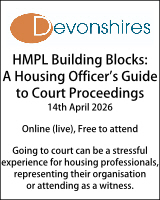Newsletter registration

Don’t refuse to mediate! Engage
Smile for the Camera?
ADHD diagnosis and disability
The coroner's duty to notify the DPP
Racist comments from one employee to another

Court of Protection case update: July 2025
Maximising ROI in renewable energy: Legal, technical, and financial strategies for net-zero success
Personal circumstances, public safety, and the planning balance
The Environment (Principles, Governance and Biodiversity Targets (Wales) Bill: the key provisions
Errors of law, materiality and remedies

What next for rent reviews?
Commonhold reform – the beginning of the end?
The CAT’s approach to Subsidy Decision Reviews: Fast, cheap and simple?
Millbrook Healthcare Limited v Devon County Council – Its impact on local government procurement
Early insights into the English Devolution and Community Empowerment Bill
The section 58 defence in the Highways Act 1980
Risk assessments in care proceedings: L-G and Re T
Turbulence ahead
PFI – a new era?
Costs in discrimination claims brought by litigants in person
The Building Safety Act and retrospective service charge protection
Right to Buy (RTB) leases — be warned about service charges
Awaab’s Law – implementation of Phase 1
Seven key insights: Lord Justice Birss considers AI in civil justice
Imperative requirements in homelessness: nuts and bolts on a bumpy roadmap to suitable accommodation
Neurodiversity in the Family Justice System Panel Discussion
Employment Law Webinar Series - May to July - 42 Bedford Row
Home Truths - Dissecting Section 16J: Criminal Confusion in the Renters’ Rights Bill - 42 Bedford Row
Home Truths: Grounds for Possession under the Renters' Rights Bill - 42 Bedford Row
Airport Subsidy Challenged in the CAT
IPA guidance 2025: Managing PFI distress and preparing for expiry
What might the public inquiry on child sexual exploitation look like
Data (Use and Access) Act – Updating Data Protection Law and more
High Court Dismisses Challenge to New Super Prison
AI, copyright and LLMs
Automatic suspensions and the public interest
FOI and communication
Too much?
Deploying ‘ADR’ in Planning & Compensation contexts
Removal from the village green register
The attendance of experts in family proceedings
Local authority enforcement powers and domestic beekeeping
Too little? When intervention is not required
Closures of educational sites
Public law case update Q1 2025
Must read
Families refusing access to support
Must read
Families refusing access to support
Blogs, online publications and defamation
 A local authority officer recently succeeded in a counter-claim for libel. Wesley O'Brien and Jonathan Moore look at the lessons to be learned.
A local authority officer recently succeeded in a counter-claim for libel. Wesley O'Brien and Jonathan Moore look at the lessons to be learned.
- Details
The recent High Court decision in Thompson v James and Carmarthenshire CC [2013] EWHC 515 (QB) considers an authority’s robust response to public criticism and accusations of corruption, and the circumstances in which a local authority employee can sue and succeed in a defamation claim.
Background
The dispute between Mrs Thompson and the council was triggered by the council’s rejection of various planning applications submitted by Mrs Thompson and her family between 2004 and 2006. The dispute escalated in 2006 when Mrs Thompson accused the council and its officers of corruption.
In 2009 Mrs Thompson began an online blog in which she repeatedly criticised the council and Mr James (the council’s chief executive). Mr James published an “open letter” in response to Mrs Thompson’s criticism in which he also explained why Mrs Thompson has been removed from a recent council meeting.
In his “open letter”, Mr James accused Mrs Thompson of conducting an unlawful and vindictive campaign of harassment, intimidation and defamation against the council staff and its members. Mrs Thompson issued court proceedings against the council and Mr James, claiming that the statements made by Mr James defamed her and had interfered with her right to respect for her private life (contrary to Article 8 of the European Convention on Human Rights).
Mr James counterclaimed in relation to statements made Mrs Thompson on her blog that Mr James was corrupt and was using public funds (referred to by Mrs Thompson as a “slush fund” set aside for Mr James for the purposes of the litigation) for his own benefit and was a liar (Mrs Thompson compared Mr James to “Pinocchio”).
The court’s decision
The court found that the words published by Mr James in his “open letter” were true (Mrs Thompson had conducted a campaign of harassment, intimidation and defamation of council staff and members) so the council and Mr James’ defence of “justification” (i.e. the sting of the statement was substantially true) succeeded. The court also commented that, even if the words published were not true, the council and Mr James’ defence of “qualified privilege” (the council and Mr James had a legal, social or moral duty to make the statements in response to Mrs Thompson’s allegations) probably would have succeeded in any event. Mrs Thompson’s claim therefore failed.
Mr James succeeded in his counterclaim and was awarded £25,000 in damages. The court found that the blog posts were defamatory and that Mrs Thompson’s pleaded defence of “honest comment” (on a matter of public interest) failed, primarily on the basis that the statements made were not supported by any facts. Although Mrs Thompson’s references to “corrupt” and “unlawful” activities were, the judge found, “an exaggerated use of language and not outside the degree of exaggeration that may be used to express opinions on political topics”, Mrs Thompson’s persistent allegations of misconduct, corruption, lying, perjury and misuse of public funds without reference to any credible evidence did amount to a campaign of harassment, intimidation and defamation. The court also found that Mrs Thompson’s motive was to injure Mr James and she had no belief in the truth of the statements she made.
Comment
The case is a useful reminder that officers of a local authority can sue for libel in connection with statements made about them which relate to the exercise or discharge of their duties as an employee of the authority. In noting that the internet has made very easy the sort of campaign carried out by Mrs Thompson, the judge acknowledged that there would be “a serious gap in the law if members and officers of a local authority (and others who work in or for other public authorities) could not sue for libel” and “if those who work in or for public authorities could not defend themselves against the dissemination of falsehoods, the public would be the losers”. A local authority also has the power to indemnify an officer for the legal costs of bringing a defamation claim (Mr James’ counterclaim was funded by the council).
However, the judge noted that civil servants acting in their official capacity must show a greater degree of tolerance to public scrutiny and criticism. This is not a surprise and it reconfirms the conclusion reached by the House of Lords in the Derbyshire case some 20 years ago. But the judge also recognised that where a person maliciously spreads false and defamatory allegations about individuals holding public offices, a libel action may be the best means of establishing the truth and preventing repetition.
The court’s decision also shows that a public authority can succeed in running a “qualified privilege” defence even where an individual’s Article 8 Convention rights are engaged in circumstances where it is the individual who has first brought matters into the public domain (Mrs Thompson invited an online response to her persistent criticisms).
Finally, although a libel claim, this case highlights conduct that may amount to harassment of local authority officers. The judge found that Mrs Thompson’s persistent allegations of corruption and lies would have caused a reasonable officer in the position of Mr James to have felt distressed and intimidated. However, the judge commented that writing a blog which is highly critical of a local authority does not necessarily amount to harassment.
Wesley O'Brien is an associate and Jonathan Moore is a solicitor in the Commercial Dispute Resolution team at Bevan Brittan. Wesley can be contacted on 0870 194 3039 or by
Senior Lawyer - Advocate
Head of Legal Shared Service
Head of Governance & University Solicitor
Director of Legal and Governance (Monitoring Officer)
Locums
Poll
20-08-2025 10:00 am
15-09-2025 10:00 am
08-10-2025 10:00 am
22-10-2025 4:00 pm
05-11-2025 4:00 pm











































